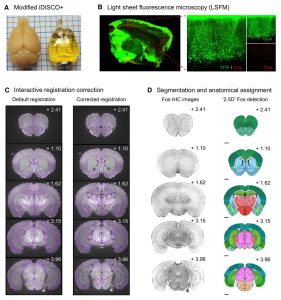SMART: An Open-Source Extension of WholeBrain for Intact Mouse Brain Registration and Segmentation
Published in eNeuro.
Authors
Michelle Jin, Joseph D Nguyen, Sophia J Weber, Carlos A Mejias-Aponte, Rajtarun Madangopal, Sam A Golden
Paper presented by Dr. Katherine Savell and selected by the NIDA TDI Paper of the Month Committee.
Background and Technological Advancement
Whole-brain activity mapping provides one way to understand which brain regions encode and control behavior and cognition. However, achieving consistent staining conditions in three-dimensional tissue and analysis of the resulting large datasets remain a challenge. Jin et al. present an optimized protocol for Fos staining, a marker of neuronal activation, in a cleared mouse brain and provide an open-source R package called SMART (Semi-Manual Alignment to Reference Templates) as an extension to the Wholebrain pipeline (PMID: 29203898). SMART is designed to make whole-brain activity mapping more accessible to researchers looking to implement the technique and analysis into their research program.
SMART: An Open-Source Extension of WholeBrain for Intact Mouse Brain Registration and Segmentation Journal Article
In: eNeuro, vol. 9, no. 3, 2022, ISSN: 2373-2822.

